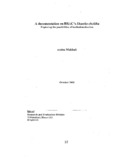| dc.contributor.author | Mahbub, Amina | |
| dc.date.accessioned | 2020-01-08T04:21:55Z | |
| dc.date.available | 2020-01-08T04:21:55Z | |
| dc.date.issued | 2000-10 | |
| dc.identifier.citation | Mahbub, A. (2000, October). A documentation on BRAC’s Shastho shebika: exploring the possibilities of institutionalisation. Research Reports (2000): Social Studies, Vol – XXV, 32–62. | en_US |
| dc.identifier.uri | http://hdl.handle.net/10361/13421 | |
| dc.description.abstract | Shastho shebikas (SS) are health cadres, selected from BRAC's Village Organisations
(VO). They are the nucleus of BRAC health programmes and are trained in preventative,
promotive and curative aspects of health. As the frontline work force, their role and
functions in BRAC health programmes are enormous. BRAC health programmes cover
approximately thirty-five million people by mobilising these shastho shebikas. BRAC
has been using the SS since 1977, and several studies have been done so far on different
aspects relevant to the SS. The present study has made an effort to document the present
situation of SS using various primary and secondary sources. Concurrently the study
tried to explore the possibilities of institutionalise the activities of SSs in the community. | en_US |
| dc.language.iso | en | en_US |
| dc.publisher | BRAC Research and Evaluation Division (RED) | en_US |
| dc.subject | Shastho shebika | en_US |
| dc.subject | BRAC | en_US |
| dc.subject | Institutionalisation | en_US |
| dc.subject | Health program | en_US |
| dc.subject | Village Organizations (VO) | en_US |
| dc.subject.lcsh | Public health | |
| dc.subject.lcsh | Health, Nutrition, and Population Program (BRAC) | |
| dc.title | A documentation on BRAC's Shastho shebika: exploring the possibilities of institutionalisation | en_US |
| dc.type | Research report | en_US |

